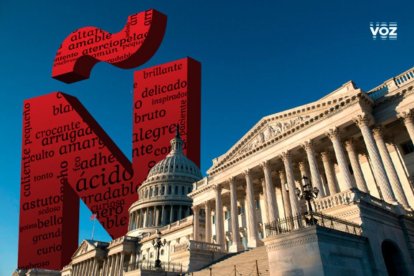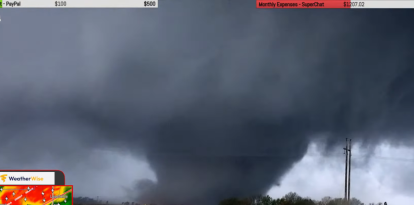The Spanish language will be decisive in the electoral race
It is estimated that more than 58 million Americans speak the language.

(Voz Media / Cordon Press)
Every April 23, the United Nations (UN) commemorates Spanish Language Day, a language that remains alive. The organization explained that "the choice of the day corresponds to the anniversary of the death of the great genius of Spanish letters, Miguel de Cervantes. Coincidentally, the date of his death coincides with that of the most prestigious English playwright, William Shakespeare. Hence both languages share the day."
It is estimated that more than 58 million Americans speak Spanish, and the use of the language in the United States continues to spread throughout the country. Of these, 43 million, 13% of the national population, use it as a vehicular language, as the Hispanic Council explains.
However, it is also a language that is used more and more frequently in American institutions. According to the organization, the use of Spanish skyrocketed in the Senate. "In 2018, there were 13 senators who used Spanish in their communication with citizens and in 2024 there are already 47 senators. 25% of all congressmen already use Spanish. In 2018, 62 congressmen used it. Since then, the total number of congressmen who use Spanish in their digital communication has increased to 113 representatives," detailed the Hispanic Council.
In that sense, it was also learned that the Republican Party is betting on the use of language in Congress. "In two years, the number of Republican senators who use Spanish in their digital communication has doubled, from 4 to 8. The number of Republican congressmen has also grown in the House of Representatives. If in 2018 there were 10 congressmen, in 2024 there will already be 21 Republican congressmen who use Spanish," the report explained.
Likewise, interest in Spanish has grown among non-Hispanic politicians. For example, the Hispanic Council indicated that in the House of Representatives, 50 congressmen are of Hispanic origin, while more than twice as many—113 representatives—use Spanish. There are still only six Hispanics in the Senate, but 47 senators use Spanish.
This growth is also reflected in society in general. According to the report, between eight and nine million students learn Spanish in the country. The language is widely present in educational curricula, from preschool to higher education, and is the most studied in the nation. In primary and secondary school courses, there are almost seven times more Spanish students than French, the second preferred language for American students.
"Spanish speakers are more conservative"
A report from the Cervantes Institute explained that 67.6% of Hispanics in the country use Spanish in their family environment. The study indicated, "The Hispanic community continues to be the main demographic breadwinner in the United States, but its growth rate has slowed in recent decades."
The study also noted that Hispanics will have a significant impact on American politics and maintained that "Spanish speakers are more conservative than English speakers on issues such as abortion, same-sex marriage and transgender people."
The institute revealed that Spanish continues to be the second most spoken native language in the world. It detailed that at least 599 million people use the language on the planet (7.5% of the population).
The institute also highlighted that more than 23 million students, specifically 23,035,198, studied Spanish as a foreign language in 2023.
Meanwhile, the General Directorate of Social Communication of Mexico pointed out that Spanish is one of the most enriched languages. According to the address, today, the language "is one of the richest languages in terms of the words used. Although, according to the Royal Spanish Academy, 'it is impossible to know the number of words in a language.' The latest edition (23rd) of the dictionary Academic (2014) recorded '93,111 entries and 195,439 meanings'; although an average speaker uses around 300 words to communicate."
Idanely Mora, an academic at the Institute of Philological Research at UNAM, pointed out to the General Directorate of Communication that the development of Spanish arose from an extensive and complex process that began with the ancient pre-Roman peoples in the Iberian Peninsula and continued with the stage of Romanization during the Roman invasion. "Our language has its origins in Latin; it must be noted that in the Middle Ages the first mention of the term Castilian arose and was consolidated with the unification of the kingdoms of Castile and Aragon."
RECOMMENDATION





















